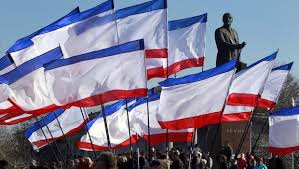By Mark Baber
April 30 – As Crimea becomes increasingly integrated into the Russian Federation, with its status within Russia apparently immutable and the large majority of Crimean residents becoming Russian citizens, the hold of the Ukrainian Football Federation over the fate of Crimean football appears increasingly iniquitous.
In the heated political atmosphere following the overthrow of the Ukrainian government and subsequent integration of Crimea into the Russian Federation, UEFA’s decision to ban Crimean clubs from competing in the third flight of Russian football from 1 January 2015 was welcomed, even by the Russian Football Federation, as a relatively moderate response to the crisis.
Faced with pressure from European politicians and the Ukrainian Football Federation, UEFA’s response was to declare Crimea a “special zone,” in which UEFA would itself organise a league in order to allow football to continue, whilst explicitly giving the Ukrainian Football Federation a veto over any integration of football in the area with Russia.
As a recent article by the AFP makes clear, in other sports accommodations are beginning to take place. For instance, Ukrainian athletics federation chief Igor Gotsul has said eight Crimean track and field athletes, including javelin star Vera Rebrik, will be allowed to compete for Russia as long as Russia agrees to compensate Ukraine for the cost of training the athletes to a professional level.
Gotsul is quoted as saying: “We’ve already informed the world athletics ruling body IAAF that together with Russia’s athletics federation we’ve found a compromise in the case of Crimean track and field athletes.”
“And we’ll give our permission for a simplified procedure of switching their sports citizenship as soon as the Russian side meets its obligations.”
Although the amount of compensation to be paid has not been revealed, rumours suggest Ukraine asked for $150,000 (€137,250) for Rebrick’s release.
Crimean windsurfers who wish to compete for Russia are also facing compensation demands of €100,000.
However, in tennis the situation is far simpler, with chief of the international tennis federation (ITF), Francesco Ricci Bitti saying, “Tennis is an individual sport and a Crimean player is free to represent any country for which he or she holds a passport.”
Bicci says, “I believe that sport cannot disregard the political environment but should not be used for political purposes.”
It is worth noting that, according to AFP’s report, Ukrainian boxer Alexander Usik, who was born and lives in the Crimean city of Simferopol, has chosen to retain his Ukrainian nationality and says he has had no problems crossing the border and has not been pressured to change his citizenship.
As the conflict between Ukraine and Russia fails to fully stabilise and no agreement appears likely on the political status of Crimea, the ban on the Crimean clubs’ participation in Russian football looks increasingly like a piece of political symbolism for which Crimean football players are paying the price. This would be at odds with the football authorities’ usual practice which is to take a pragmatic approach in the interests of development and participation in football at a local level.
From a Palestinian point of view, it is worth noting, UEFA’s ban on Crimean clubs playing in Russia provides significant ammunition for their argument Israel should be banned for allowing settler teams from the occupied West Bank to participate in Israeli leagues.
Contact the writer of this story at moc.l1745056533labto1745056533ofdlr1745056533owedi1745056533sni@r1745056533ebab.1745056533kram1745056533

